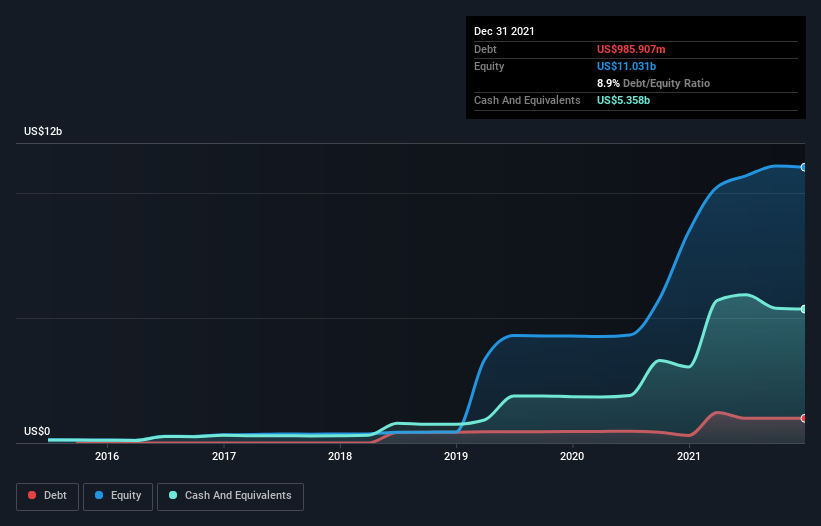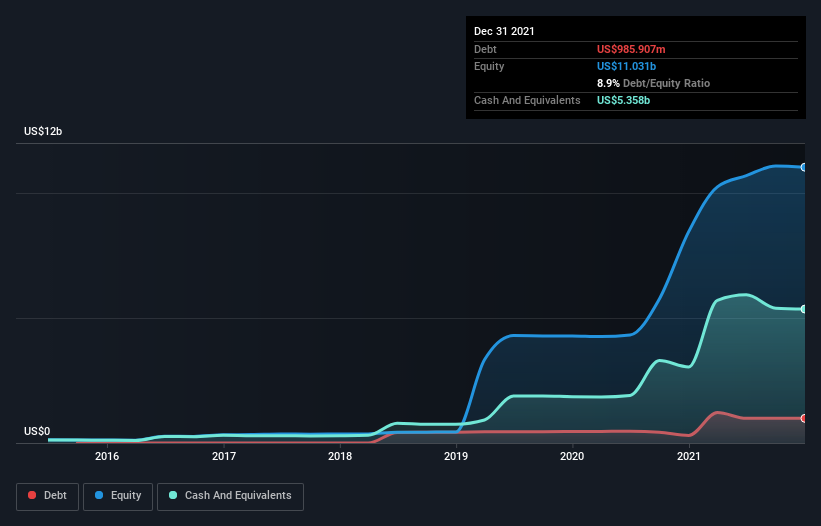Warren Buffett famously said, ‘Volatility is far from synonymous with risk.’ It’s only natural to consider a company’s balance sheet when you examine how risky it is, since debt is often involved when a business collapses. We can see that Twilio Inc. (NYSE:TWLO) does use debt in its business. But should shareholders be worried about its use of debt?
Why Does Debt Bring Risk?
Debt and other liabilities become risky for a business when it cannot easily fulfill those obligations, either with free cash flow or by raising capital at an attractive price. If things get really bad, the lenders can take control of the business. However, a more usual (but still expensive) situation is where a company must dilute shareholders at a cheap share price simply to get debt under control. Of course, plenty of companies use debt to fund growth, without any negative consequences. The first step when considering a company’s debt levels is to consider its cash and debt together.
See our latest analysis for Twilio
What Is Twilio’s Debt?
The image below, which you can click on for greater detail, shows that at December 2021 Twilio had debt of US$985.9m, up from US$302.1m in one year. But it also has US$5.36b in cash to offset that, meaning it has US$4.37b net cash.
How Healthy Is Twilio’s Balance Sheet?
Zooming in on the latest balance sheet data, we can see that Twilio had liabilities of US$703.6m due within 12 months and liabilities of US$1.26b due beyond that. Offsetting these obligations, it had cash of US$5.36b as well as receivables valued at US$388.2m due within 12 months. So it actually has US$3.78b more liquid assets than total liabilities.
This surplus suggests that Twilio has a conservative balance sheet, and could probably eliminate its debt without much difficulty. Succinctly put, Twilio boasts net cash, so it’s fair to say it does not have a heavy debt load! The balance sheet is clearly the area to focus on when you are analysing debt. But ultimately the future profitability of the business will decide if Twilio can strengthen its balance sheet over time. So if you’re focused on the future you can check out this free report showing analyst profit forecasts.
In the last year Twilio wasn’t profitable at an EBIT level, but managed to grow its revenue by 61%, to US$2.8b. With any luck the company will be able to grow its way to profitability.
So How Risky Is Twilio?
Statistically speaking companies that lose money are riskier than those that make money. And the fact is that over the last twelve months Twilio lost money at the earnings before interest and tax (EBIT) line. Indeed, in that time it burnt through US$148m of cash and made a loss of US$950m. But the saving grace is the US$4.37b on the balance sheet. That means it could keep spending at its current rate for more than two years. With very solid revenue growth in the last year, Twilio may be on a path to profitability. Pre-profit companies are often risky, but they can also offer great rewards. The balance sheet is clearly the area to focus on when you are analysing debt. However, not all investment risk resides within the balance sheet – far from it. Case in point: We’ve spotted 5 warning signs for Twilio you should be aware of, and 1 of them is a bit concerning.
If you’re interested in investing in businesses that can grow profits without the burden of debt, then check out this free list of growing businesses that have net cash on the balance sheet.
Have feedback on this article? Concerned about the content? Get in touch with us directly. Alternatively, email editorial-team (at) simplywallst.com.
This article by Simply Wall St is general in nature. We provide commentary based on historical data and analyst forecasts only using an unbiased methodology and our articles are not intended to be financial advice. It does not constitute a recommendation to buy or sell any stock, and does not take account of your objectives, or your financial situation. We aim to bring you long-term focused analysis driven by fundamental data. Note that our analysis may not factor in the latest price-sensitive company announcements or qualitative material. Simply Wall St has no position in any stocks mentioned.












Add Comment